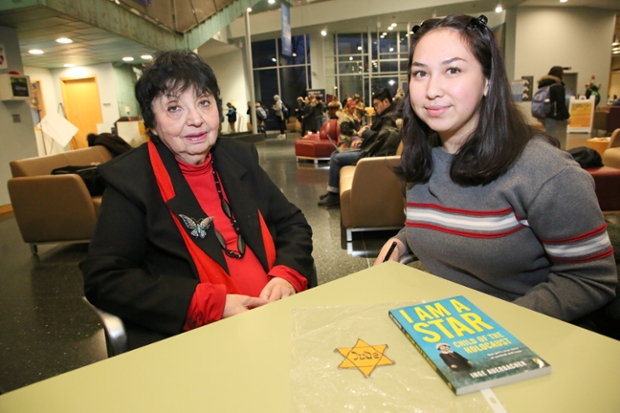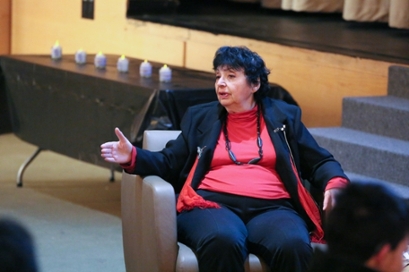Still bearing witness: Terezin survivor shares her story
 Photo/Mike Lovett
Photo/Mike LovettTerezin survivor Inge Auerbacher spoke with Mutiara Carney '22
Inge Auerbacher was seven years old when she was deported from her home in Kippenheim, Germany to the Terezin Concentration Camp. She spent three years in captivity before being liberated from the Nazis by the Soviet Army in 1945. Seventy-five years later, she continues to share her story.
When I met Ms. Auerbacher on Jan. 28, she was preparing to gather with students and faculty in the Shapiro Campus Center Theater to share her memories as a child survivor of the Holocaust. Her visit to Brandeis – which was organized by Brandeis Hillel, Chabad at Brandeis, the Center for German and European Studies, and Together Restoring Their Names – corresponded with the 75th anniversary of the liberation of Auschwitz and International Holocaust Remembrance Day.Auerbacher had just arrived at Brandeis from speaking at a nearby high school. It had been a long day, but she greeted me with a warm smile as she sipped her coffee. She wore a butterfly brooch which she later told me was a reference to the poem “The Butterfly” written by Holocaust victim Pavel Friedmann in 1942 while he was being held in Terezin. Butterflies have now become a symbol for the one and a half million children killed during the Holocaust and an emblem for Holocaust education.
Although the anniversary of the liberation of Auschwitz and Holocaust Rememberance Day are being oberserved internationally, many young people remain in the dark about the genocide. A recent survey found that less than 40 percent of American teens know that six million Jews were killed in the Holocaust, and only one-third of teens know that Hitler was elected democratically. “Holocaust education should be instituted in every state,” Auerbacher told me when I expressed my frustration at this situation. “It is a must.”Last June, Texas became only the 12th state to require students in public schools be taught formally about the Holocaust. While this is great progress for a state where Jews make up less than one percent of the total population, Auerbacher emphasized that it will take much more work to end Holocaust denial and ignorance in this country.
“What you don’t know isn’t important to you,” she explained, and what you do know often isn’t true. Antisemitism and misinformation lend themselves to the spread of false knowledge, making formalized Holocaust education all the more important.

Inge Auerbacher spoke to an audience of Brandeis students on the 75th anniversary of the liberation of Auschwitz.
Along with education, Auerbacher highlighted religious tolerance as a way to learn from the atrocities of the Holocaust.
“There are similarities [among] all religions,” she told me. “They all preach goodness.” She encourages visiting places of worship from different religions and sitting through a service to see what you may learn. “It’s not about ‘them or us.’ We are together on this planet, whether one belongs to one religion or another.” Auerbacher has not always been public about her experiences as a Holocaust survivor. Prior to 1981 she was private about her memories of the war, but at the first World Gathering of Jewish Holocaust Survivors in Israel she decided to share a poem she wrote and had turned into a song called “We Shall Never Forget.” That international platform helped the song gain publicity on the radio, and Auerbacher decided the time had come to share her story with the world. Since 1981, she has published more than 50 of her poems and articles as well as several books. She also lectured worldwide while working as a chemist for 38 years before retiring to travel and speak about her experiences full-time.
Around 200 Holocaust survivors gathered at Auschwitz this year for the memorial ceremony. Fifteen years ago at the 50th anniversary of the liberation, there were 1,500 survivors. As the years pass, Auerbacher’s dedication to sharing her experiences becomes more urgent.
“I don’t like fiction,” she told me. “I’d rather have [people] read real stories from a survivor.”By talking about the atrocities comitted in the Holocaust, Auerbacher equips younger generations with knowledge and advocates for tolerance. In doing so, she holds close to her Brandeis’ values of truth and enlightenment.
“Knowledge is the most important thing,” Auerbacher said. “To get to the truth.”Categories: Student Life





